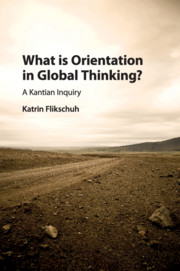
-
Select format
-
- Publisher:
- Cambridge University Press
- Publication date:
- October 2017
- October 2017
- ISBN:
- 9780511777264
- 9781107003811
- 9781108813051
- Dimensions:
- (228 x 152 mm)
- Weight & Pages:
- 0.5kg, 262 Pages
- Dimensions:
- (229 x 152 mm)
- Weight & Pages:
- 0.3kg, 265 Pages
You may already have access via personal or institutional login
Book description
Starting from Kant's striking question 'What is orientation in thinking?', this book argues that the main challenge facing global normative theorising lies in its failure to acknowledge its conceptual inadequacies. We do not know how to reason globally; instead, we tend to apply our domestic political experiences to the global context. Katrin Flikschuh argues that we must develop a form of global reasoning that is sensitive to the variability of contexts: rather than trying to identify a uniquely shareable set of substantive principles, we need to appreciate and understand local reasons for action. Her original and incisive study shows how such reasoning can benefit from the open-ended nature of Kant's systematic but non-dogmatic philosophical thinking, and from reorientation from a domestic to a non-domestic frame of thought. It will appeal to all those interested in global moral issues, as well as to Kant scholars.
Contents
Metrics
Altmetric attention score
Full text views
Full text views help Loading metrics...
Loading metrics...
* Views captured on Cambridge Core between #date#. This data will be updated every 24 hours.
Usage data cannot currently be displayed.
Accessibility standard: Unknown
Why this information is here
This section outlines the accessibility features of this content - including support for screen readers, full keyboard navigation and high-contrast display options. This may not be relevant for you.
Accessibility Information
Accessibility compliance for the PDF of this book is currently unknown and may be updated in the future.


